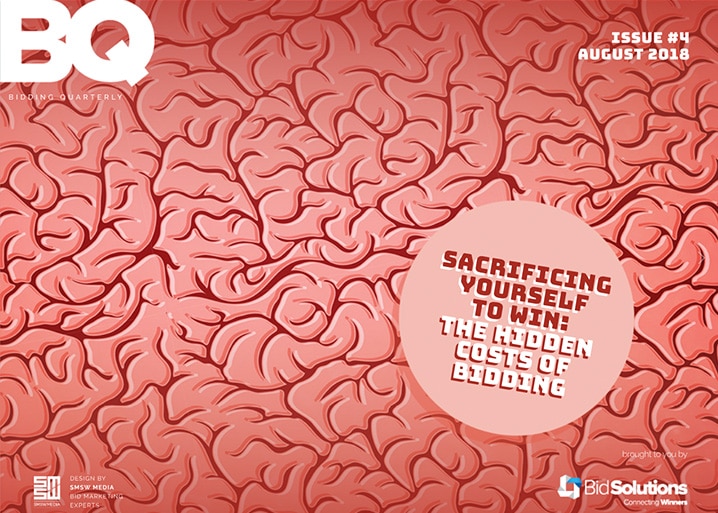Back in 1999, I was introduced to the world of bidding:
“Fancy writing a bid, Nige?” said the Sales Manager. “It’s a high pressure, high adrenaline role that favours those who love ‘pure challenge’. I think you’d enjoy it.” I gave ‘it’ a go, losing my first bid but learning from my mistakes until I won virtually everything I submitted. By 2009 I was addicted to winning, pushing myself to work 100 hours per week while managing up to 20 concurrent bids and ‘filling the gap’ left by ineffective salespeople. By 2014, my team of 220 people was submitting 6,500 bids per year and winning 79% of them. We were unstoppably successful. Or so we thought. One by one we began to fall. And then it was my turn.
I became tired and fuzzy-headed. Ocular migraines (a ‘waterfall’ sensation in one’s vision, combined with headaches and nausea) occurred every day. I began moving slowly and had trouble remembering names and actions. I became unpredictably argumentative, impatient, and intolerant of others’ views. Realising that I couldn’t trust myself to behave rationally, I elected to work from home. There, with the phone ringing relentlessly, I sat at my desk, crying and trembling. My wife encouraged me to see a doctor, who signed me off work for two weeks and prescribed a four-month course of Cognitive Behavioural Therapy “to help break a cycle of anxiety and depression”.
I returned to work and was doing well until a customer emailed me at 5pm with their demands for an ‘improved offer’ by 7am the following morning. I cancelled by plans, rallied my team, and worked through the night. We submitted the proposal on time. But then the customer did the same thing again the next night, and every night for five months. When our 100th BAFO was accepted, I was hailed as a hero. But a colleague had suffered a fatal heart attack during the process and my marriage was in tatters. I returned home and cried myself to sleep, vowing that I would never let someone put me or my team through so much again.
I woke the following morning to a sense of confusion and numbness – not recognising my daughter or, as I attempted to get ready for work, being able to figure out how to put on my socks. I fell to the floor and crawled under the bed, shaking uncontrollably and seeing everyone and everything as a threat to my safety. Seven hours later, I was sitting in a hospital room with a consultant looming over me. She was explaining that I was having a “psychotic episode” and “should be detained for my safety and that of those around me”. The consultant gave me an option – that if I agreed to being medicated for ‘an extended period’ then I would not be a threat to society. This seemed like a better alternative to being sectioned, so I agreed to a programme of anti-depressants that saw me sleep almost non-stop for six months and exist without internal thought for a further four months. I’d lost my mind in order to win.
My breakdown made me realise that we bidders inherently give our all, but absolute focus should only be given to that which matters absolutely. We should seek to win, but not at all costs.
This article was written by Nigel Hudson.

